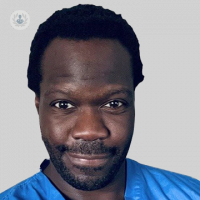When should hip replacements be considered?
Escrito por:Have you recently been considering undergoing hip replacement surgery? Find out when the ideal time to do is in this article below, as revered consultant orthopaedic surgeon, Mr Tofunmi Oni, reveals all.

When should hip replacements be considered?
Hip replacements are generally considered when patients are not able to cope with the pain that they have coming from their pain. This is usually after the hip has been worn away due to trauma, or different types of hip arthritis.
How are hip replacements performed? What are the risks involved?
Hip replacements are always performed under an anaesthetic, generally a spinal anaesthetic. Generally, the patients are on their side, and we go through the layers of skin and fat and replace both the ball and socket of the hip with artificial components.
Hip replacement surgery is very successful normally. There are, however, risks associated. The main potential risks include:
- The ball coming out of the socket
- Bleeding
- One limb being slightly smaller/bigger than the other
- Clots
- Infection
- Damage to nerves and veins near the hip
The important thing to highlight here though is the fact that the long-term survivorship of hip replacements is extremely good.
What material is the artificial joint made of?
Hip replacements are made with multiple materials. There are specifics related to specific hip replacement surgery, but mostly an uncemented hip replacement is the standard. The component that goes in the thigh bone is titanium. The small head is made with a ceramic and the socket is made with a high-density plastic material and a titanium shell.
What side effects can patients experience after hip replacement surgery?
A lot of medications given after the anaesthetic can naturally cause people to feel lightheaded and nauseous. There is a certain amount of blood loss involved in hip replacement surgery, but the majority of patients are able to start their rehabilitation the day after surgery.
How long does it take to make a complete recovery?
It depends on what kind of physical activity patients are aiming to get back to. In and around the six-week mark after surgery, patients are able to move pain-free and independently.
If you would like to make an appointment today with Mr Tofunmi Oni, you can do so via his Top Doctors profile.


